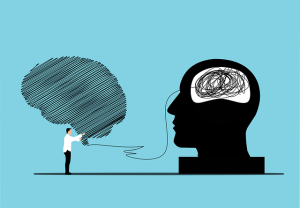Mindfulness-based cognitive therapy (MBCT) is a scientifically proven and innovative depression treatment program that integrates mindfulness practices with cognitive-behavioral techniques. Through guided meditations, body scans, and other exercises, individuals learn to observe thoughts without judgment, detach from negative emotions, and gain insights into their thought patterns. MBCT effectively targets both depressive symptoms and their causes, promoting emotional regulation, enhanced coping strategies, and long-term mental well-being, making it a powerful tool for preventing relapse in major depressive disorder. Selecting a qualified MBCT practitioner is crucial; look for certified professionals with practical experience and a therapeutic approach that aligns with your needs.
Discover the transformative power of Mindfulness-Based Cognitive Therapy (MBCT) in this comprehensive guide. Learn how MBCT differs from conventional depression treatment plans, delving into its unique approach that combines mindfulness practices with cognitive therapy techniques. Explore the scientific evidence supporting its efficacy and understand the key components of an effective MBCT program. We’ll also navigate integration strategies for healthcare providers and provide tips for finding qualified practitioners, offering valuable insights for enhanced depression treatment outcomes.
Understanding Mindfulness-Based Cognitive Therapy (MBCT)

Mindfulness-based cognitive therapy (MBCT) is a powerful approach that combines mindfulness practices with cognitive therapeutic techniques to effectively manage and prevent depressive episodes. This therapy program is designed to help individuals develop skills to recognize and change negative thought patterns, thereby improving their overall mental well-being. By integrating mindfulness into traditional cognitive therapy, MBCT offers a unique and innovative depression treatment.
The core concept of MBCT involves teaching participants how to be present in the moment, observe their thoughts without judgment, and cultivate a non-reactive mindset. This practice is particularly beneficial for those who have experienced recurrent depression, as it equips them with tools to prevent relapses. Through guided meditations, body scans, and other mindfulness exercises, individuals learn to detach from negative emotions and gain a deeper understanding of their thought processes, leading to improved coping strategies in the long term.
How MBCT Differs from Traditional Depression Treatment Programs

Mindfulness-based cognitive therapy (MBCT) offers a distinct approach compared to traditional depression treatment programs. While standard programs often focus on managing symptoms through medication and talk therapy, MBCT delves deeper into the root causes of depression by training individuals to be present and non-judgmental. This form of therapy encourages active participation in one’s own mental processes, fostering a sense of control and resilience.
In contrast, conventional depression treatments may not adequately address the recurring nature of depressive episodes. MBCT, however, incorporates mindfulness practices to help individuals recognize and disrupt negative thought patterns before they escalate. By integrating cognitive techniques with mindfulness exercises, MBCT provides participants with valuable tools to navigate their mental health journey more effectively, aiming to prevent future relapses and promote long-term well-being.
The Science Behind MBCT: Evidence for Its Efficacy

The Science Behind MBCT: Evidence for Its Efficacy
Mindfulness-based cognitive therapy (MBCT) is a powerful tool in the realm of depression treatment programs, backed by extensive scientific research. This therapeutic approach combines mindfulness practices with cognitive-behavioral techniques to help individuals manage symptoms and prevent depressive episodes. Numerous studies have demonstrated MBCT’s efficacy, showing significant improvements in mood regulation, anxiety reduction, and overall well-being compared to other standard treatments.
The evidence for MBCT’s success lies in its unique ability to target both the symptoms of depression and their underlying causes. By fostering mindfulness, individuals learn to observe and accept thoughts and emotions without judgment, breaking negative thought patterns. This cognitive shift enables better coping mechanisms, enhances resilience, and promotes a more balanced emotional state. As a result, MBCT has been recognized as an effective intervention for preventing relapse in major depressive disorder, offering long-lasting benefits for those seeking lasting solutions to depression.
Components of an Effective MBCT Program

An effective Mindfulness-based Cognitive Therapy (MBCT) program for depression treatment programs involves a combination of key components designed to empower individuals with lasting coping strategies. The first crucial element is structured mindfulness practices, which include guided meditations and breathing exercises tailored to help participants cultivate present-moment awareness and reduce rumination. These practices not only enhance overall well-being but also serve as a foundation for navigating emotional challenges.
Additionally, cognitive therapy techniques within MBCT programs focus on identifying and challenging negative thought patterns and beliefs that contribute to depression. Through a collaborative therapeutic process, individuals learn to recognize distorted thinking, replace it with more balanced perspectives, and develop healthier ways of responding to stress and adversity. This cognitive restructuring, combined with mindfulness, equips participants with powerful tools to manage depressive symptoms proactively and prevent relapse in the long term.
Integrating MBCT into Depression Treatment Plans

Mindfulness-based cognitive therapy (MBCT) has emerged as a powerful tool in the arsenal of depression treatment programs. By combining elements of cognitive therapy with mindfulness practices, MBCT offers a unique approach to managing depressive symptoms and preventing relapse. This integrated method encourages individuals to become more aware of their thoughts and emotions without judgment, fostering a deeper understanding of their mental health.
When incorporated into depression treatment plans, MBCT helps patients develop coping strategies that promote emotional regulation and enhance overall well-being. Through regular mindfulness exercises, individuals learn to acknowledge and accept negative thoughts and feelings, allowing them to respond rather than react to stressful situations. This proactive mindset shifts the focus from simply managing symptoms to fostering resilience and a more positive relationship with one’s mental health.
Finding and Selecting a Qualified MBCT Practitioner

When considering Mindfulness-based Cognitive Therapy (MBCT) as a depression treatment program, finding and selecting a qualified practitioner is paramount. Look for professionals who are certified in MBCT by reputable organizations. These experts should have completed advanced training in this therapeutic approach and possess practical experience in helping individuals manage depression and prevent relapse.
Reputations matter; seek recommendations from healthcare providers or people who have successfully undergone MBCT. Check reviews, online credentials, and the practitioner’s approach to ensure they align with your needs and expectations. A good fit is crucial for effective therapy, so take the time to interview several practitioners before making a decision.
